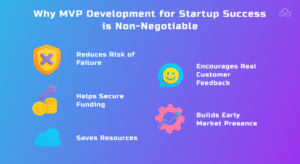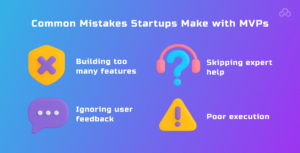Introduction
Every startup begins with a small idea, but evolving that idea into a successful business is always complex. In the early stages often the resources are limited, risks are high, and time is actually less. So, this is where MVP development for startup journeys becomes important. An MVP, or Minimum Viable Product, helps founders to experiment their idea in the real market without investing too much in full-scale product development.
In today’s advanced digital world, building an MVP is no longer a choice but almost a necessity for startups that want to survive and sustain. With the support of MVP development agencies or an experienced MVP development consultant, startups can validate their concept to attract early users, and gain funding for further growth.
In this blog, we will explore why MVP development is important for any business, the benefits it provides, and how it fits into the overall startup journey.
What is an MVP in Simple Terms?
An MVP, or Minimum Viable Product, is the basic version of your product that solves the main problem for your target audience. Think of it as the pillar of a house. You may not have all the fancy features yet, but the structure is strong enough to experiment whether people actually need it.
For instance, when Uber first launched it was not the fully feature-packed app we see today. It was simply allowing users to book a cab and make payments. This simple MVP gave Uber important data and metrics and the confidence to grow. Similarly, startups in the software world often use MVP for software development to experiment an idea before committing significant investments.
Why MVP Development for Startup Success is Non-Negotiable

1. Reduces Risk of Failure
One of the biggest blockages for startups is uncertainty. Many entrepreneurs build products based on assumptions rather than what actual customers need. By investing in MVP development for startup journeys the founders can launch a simple version of their idea and see if people are interested or not. If customers do not respond positively, they can change their idea without losing too much time or money.
2. Helps Secure Funding
Investors are more likely to support a startup that already has an MVP because it shows proof of concept and idea. A working MVP tells that the idea has potential in the real market. With the help of MVP development agencies, startups can build a polished prototype that attracts investor attention and increases the chances of funding.
3. Saves Resources
Building a full product from day one can drain your resources. Instead, MVP development for startup projects focuses on core features only. This not only saves money but also allows teams to make smarter decisions about which features to add next based on user feedback.
4. Encourages Real Customer Feedback
Startups often assume they know what customers want, but assumptions can be dangerous. An MVP allows you to put something tangible into users hands and get genuine feedback. Using agile development MVP approaches the startups to make continuous improvements based on feedback and market demand.
5. Builds Early Market Presence
In competitive industries, timing is everything. Launching quickly with an MVP helps startups enter the market early. Even a basic version of the product can attract initial users and create buzz. Over time, this early presence becomes an advantage when scaling.
MVP for Software Development: The Smart Path Forward
When it comes to technology startups the software development is usually the backbone.But , building full-fledged software takes time and huge investment. This is why MVP for software development is so powerful.
Instead of waiting years to get a perfect product, startups can create a simplified software solution that delivers the main value. For example, if you are building a project management app, the MVP may only include task assignment and progress tracking features. Once users start using it, you can add advanced reporting like integrations, and AI-powered features.
The beauty of MVP for software development is that it gives startups the ability to validate their ideas while staying lean. It also ensures that every feature added later is based on actual demand rather than following any trend.
Role of MVP Development Agencies in Startup Growth
Many startups lack in-house technical expertise, and that is where MVP development agencies step in. These agencies specialize in creating MVPs quickly and effectively. They bring together designers, developers, and strategists who understand the unique needs of startups.
Collaborating with an agency saves founders from the trial-and-error process. It provides them with industry best practices and proven methodologies. For instance, an experienced agency can guide a founder through defining core features for choosing the right technology stack, and ensuring scalability.
Moreover, MVP development agencies often work with multiple startups across different industries. This experience allows them to identify potential pitfalls and suggest strategies that increase the chances of success.
Why Agile Development MVP is the Perfect Approach
The startup journey is full of uncertainties, which means flexibility is crucial. That is why the agile development MVP approach is widely adopted. Agile emphasizes small iterations, constant feedback, and continuous improvement.
Instead of spending months building a final product, startups release small updates and improvements regularly. And this way, they remain organised with customer needs while reducing wasted effort. Agile also allows startups to change quickly if feedback suggests that a different direction is more promising.
In short, agile development MVP helps startups move faster to adapt better, and improve consistently. It is the perfect match for the fast-changing startup ecosystem.
How an MVP Development Consultant Adds Value
Sometimes startups do not just need technical help but also strategic guidance. This is where an MVP development consultant plays a key role. Consultants bring in a wealth of experience in product strategy, market positioning, and customer validation.
An MVP development consultant helps startups:
-
Define the main value proposition
-
Prioritize core features
-
Identify the target audience
-
Align development with business goals
-
Prepare for investor pitches
By combining technical and strategic insights the consultants ensure that the MVP does not just exist as a product but also as a solid foundation for growth.
Real-World Examples of MVP Success
Many of today’s tech giants started as simple MVPs.
-
Airbnb began with the founders renting out air mattresses in their apartment. The MVP was a basic website to connect hosts and travelers. Today, Airbnb is a global hospitality brand.
-
Dropbox started with a short demo video explaining how file synchronization would work. The feedback from that MVP validated the idea and led to the creation of the platform we all know.
-
Spotify initially launched as a simple desktop app focusing only on music streaming. Over time, it expanded to mobile apps, podcasts, and AI-driven recommendations.
These examples prove that MVP development for startup journeys is not just a theoretical concept but a proven pathway to success.
Common Mistakes Startups Make with MVPs

While MVPs are powerful, many startups make mistakes that reduce their effectiveness. Here are some to avoid:
-
Building too many features – An MVP should be lean. As adding unnecessary features defeats the purpose.
-
Ignoring user feedback – The main reason for launching an MVP is to get real insights. Ignoring feedback wastes opportunities.
-
Poor execution – Even an MVP needs to be functional and user-friendly. A badly designed MVP can drive away users.
-
Skipping expert help – Not involving MVP development agencies or an MVP development consultant often leads to avoidable mistakes.
The Future of MVP Development
The concept of MVP is evolving everyday with technology trends. For instance, AI and low-code platforms are making it easier and faster to build MVPs. Many startups now use cloud solutions to scale their MVP without huge infrastructure costs.
Additionally, agile development MVP practices are becoming more refined and easy to use , allowing startups to test multiple ideas simultaneously. This means that future startups will be able to experiment more effectively and increase their chances of finding a winning idea.
Conclusion
For any startup, the early stages are the most fragile. Decisions made during this time can determine success or failure. MVP development for startup growth is not just about building a product but about creating a learning process. It helps startups validate ideas, attract investors, save resources, and gain real customer insights.
Whether you work with MVP development agencies or an MVP development consultant, the goal remains the same: that is to build a product that solves real problems while minimizing the risks. By adopting MVP for software development and following agile development MVP practices your startups can move confidently toward building products that matter.
So if you are a startup founder always remember that your MVP is your best friend in the journey ahead. It is not about launching big on day one, but about learning fast to improve continuously, and growing sustainably in the market.
Do you like to read more educational content? Read our blogs at Cloudastra Technologies or contact us for business enquiry at Cloudastra Contact Us.